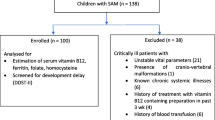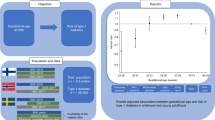Abstract
Objective
To assess the effect of zinc supplementation on neuro-development and growth of preterm neonates.
Setting
Referral neonatal unit of a teaching hospital.
Design
Open-labeled Randomized controlled trial.
Participants
100 preterm neonates.
Intervention
Participants randomized to receive oral zinc (study group) or not (controls).
Main Outcome Measures
Primary: Neuro-development status at 40 weeks post conceptional age and at 3 month corrected age using Amiel-Tison neurologic assessment. Secondary: anthropometry and serum alkaline phosphatase at 3 months corrected age.
Results
At 40 weeks post-conceptional age, greater number of zinc supplemented infants demonstrated alertness and attention pattern normal for their age (P=0.02). Higher number of controls showed signs of hyper-excitability at 40 week post-conceptional age (P=0.001) and 3 months corrected age (P=0.003). At 3 month corrected age, mean serum alkaline phosphatase level was significantly higher in the study group compared to controls.
Conclusion
Zinc supplementation till 3 month corrected age in preterm breastfed infants improves alertness and attention pattern; and decreases signs of hyperexcitability, and proportion with abnormal reflexes.
Similar content being viewed by others
References
Black M. Zinc deficiency and child developmental. Am J Clin Nutr. 1998;68(suppl):464–9.
Pfeiffer CC, Braverman ER. Zinc, the brain and behavior. Biol Psychiatry. 1982;17:513–32.
Halas ES, Eberhardt MJ, Diers MA, Sandstead SS. Learning and memory impairment in adult rats due to severe zinc deficiency during lactation. Physiol Behav. 1983;30:371–81.
Friel JK, Andrews WL. Zinc requirement of premature infants. Nutrition. 1994;10:63–5.
Bahl L, Chaudhuri LS, Pathak RM. Study of serum zinc in neonates and their mothers in Shimla Hills (Himachal Pradesh). Indian J Pediatr. 1994;61:571–5.
Zlotkin SH, Cherian MG. Hepatic metallothionein as a source of zinc and cysteine during the first year of life. Pediatr Res. 1988;24:326–9.
Agostoni, C, Buonocore G, Carnielli VP, de Curtis M, Darmaun D, Decsi T, et al. Enteral nutrient supply for preterm infants: commentary from the European Society of Pediatric Gastroenterology, Hepatology and Nutrition Committee on Nutrition. J Pediatr Gastroenterol Nutr. 2010;50:85–91.
Amiel-Tison C, Gosselin J. Neurological development from birth to six years. The John Hopkins University Press. Baltimore.2001. p. 101–9.
Amiel-Tison C. Update of the Amiel-Tison neurologic assessment for the term neonate or at 40 weeks corrected age. Pediatr Neurol. 2002;27:196–212.
Friel JK, Andrews WL, Matthew JD, Long DR, Cornel AM, Cox M, et al. Zinc supplementation in very-low-birthweight infants. J Pediatr Gastroenterol Nutr. 1993;17:97–104.
Ashworth A, Morris SS, Lira PI, Grantham-McGregor SM. Zinc supplementation, mental development and behaviour in low birth weight infants in northeast Brazil. Eur J Clin Nutr. 1998;52:223–7.
Gulani A, Bhatnagar S, Sachdev HP. Neonatal zinc supplementation for prevention of mortality and morbidity in breastfed low birth weight infants. Systematic review of randomized controlled trials: Indian Pediatr. 2011;48: 111–7.
Sazawal S, Black RE, Menon VP, Dinghra P, Caulfield LE, Dhingra U, et al. Zinc supplementation in infants born small for gestational age reduces mortality: A prospective, randomized, controlled trial. Pediatrics. 2001;108:1280–6.
Lira PI, Ashworth A, Morris SS. Effect of zinc supplementation on the morbidity, immune function, and growth of low-birth-weight, full term infants in northeast Brazil. Am J Clin Nutr. 1998;68:418–24.
Taneja S, Bhandari N, Rongsen-Chandola T, Mahalanabis D, Fontaine O, Bhan MK. Effect of zinc supplementation on morbidity and growth in hospital-born, low-birthweight infants. Am J Clin Nutr. 2009;90:385–91.
Osendrap SJ, Santosham M, Black RE, Wahed MA, Van Raaij JM, Fuchs GJ. Effect of zinc supplementation between 1 and 6 mo of life on growth and morbidity of Bangladeshi infants in urban slums. Am J Clin Nutr. 2002;76:1401–8.
Sazawal S, Black RE, Bhan MK, Jalla S, Sinha A, Bhandari N. Efficacy of zinc supplementation in reducing the incidence and prevalence of acute diarrhea: A communitybased, double blind, controlled trial. Am J Clin Nutr. 1997;66:413–8.
Sazawal S, Black RE, Jalla S, Mazumdar S, Sinha A, Bhan MK. Zinc supplementation reduces the incidence of acute lower respiratory infections in infants and preschool children: a double blind, controlled trial. Pediatrics. 1998;102:1–5.
Author information
Authors and Affiliations
Corresponding author
Rights and permissions
About this article
Cite this article
Mathur, N., Agarwal, D.K. Zinc supplementation in preterm neonates and neurological development: A randomized controlled trial . Indian Pediatr 52, 951–955 (2015). https://doi.org/10.1007/s13312-015-0751-6
Received:
Revised:
Accepted:
Published:
Issue Date:
DOI: https://doi.org/10.1007/s13312-015-0751-6




